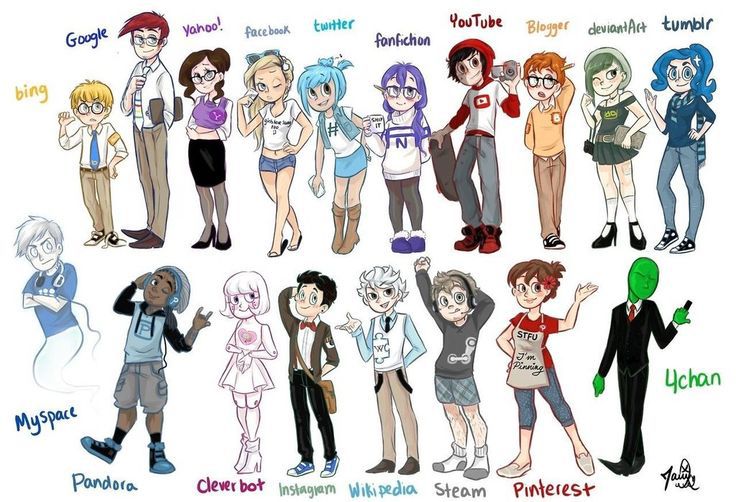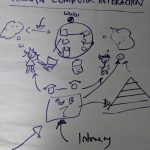Knowledge is only a rumour until it is in the muscle
saying from the Huli Wigmen
For me, the main difference between being social online and offline is, to be social online we have to be active. Offline, we can be passive. We can be involuntarily social in real life just by showing up. We don’t even have to talk. In fact, sometimes it’s better if we don’t.
Online, social computing refers to the systems which support humans who share and use information such as teams, communities, organisations, and markets. Some ways like photos or status updates on social media platforms are obviously social especially if we have our family and friends online with us, less obviously it may be bidding on eBay or writing a blog – we are doing it, because we presume we have an audience, we have other people in our minds. Recently, I wrote about Virtual Presence, and then The Sustainable Academic wrote a response which turned my monologue into a dialogue. How fabulous is that?
Technology like RSS and permalinks, bridges people’s blogs and then on Amazon or Argos, content generated by social interaction is used to produce new functionality and value for their users. So, we have the most helpful favourable review, and the most helpful critical review. This helps users get a summary of reviews quite quickly and for those who like to review the chance to be seen as a top reviewer which of course encourages reviewers to write more reviews.
It is a study in user participation. Rather like Napster was. Instead of a central database of songs, it had every downloading user become a server, and thus grew a network.
Amazing really since the main question with the birth of the WWW was: Who would put information up for free? Turns out not just information, but songs and bandwidth too. We feel better when we connect and share. Indeed PageRank based its ranking of the importance of pages on how many connections (links) a page had, which can be good and bad depending on who is doing the linking and why. However, writing Wikipedia entries as well as debating the policies and guidelines to improve an infrastructure has led to great accurate pages. Open source software works the same way, people are absorbed coding and teaching in their spare time to make better software for everyone free of charge.
Writing this, I feel all warm and fuzzy, the Internet is a lovely place to be, but then, we get the not so loveliness, the trolling, the prejudice, the awful videos of violence and crime uploaded and left online which once seen cannot be unseen. Apparently, terrible behaviour happens more easily online because offline in our communities we have strong institutions, social norms and laws/comeback from the people around us. Online we only have the weak institutions of social media so people feel freer to say and do whatever they want to as there is very little comeback. And, these people are not behaving like that online or offline I presume in front of family and friends, they are faceless and fake-named, and might be quite different in real life.
A recent article on the BBC talked about how child abuse videos on Facebook have remained online even after many complaints. One Facebook employer is quoted as saying that they can’t censor too much as people will leave the platform, and they don’t want that as: It’s all about making money at the end of the day. Don’t be fooled by the word social.
This was demonstrated in a BBC interview last year with Theresa Hong who led up Trump’s social media campaign HQ to get him elected:
Interviewer: What were Facebook, YouTube, and Google people doing here?
Hong: They were helping us… They were basically our hands on partners.
Trump spent $95m alone on Facebook ad campaigns so Facebook sent over loads of people to help with A/B testing and trialling of colours and buttons and ads to persuade people to vote for Trump. He bought time and skills from Facebook. Hong also wrote Trump’s Facebook entries saying that it was easy for her to write in Trump’s style because: He was authentic, he was refreshing.
I saw a thread on Twitter yesterday wondering about Hong as a person: Is she nuts? In her job, I guess it is rare to meet someone who is saying exactly what they think, when the rest of the time many people who want to be leaders and crave power lose touch with why they wanted to be leaders and will do and say anything to gain influence over other people who stop being people and are viewed as mere commodities. History is full of examples.
It is insidious. Let’s take a look at the language used around social media and social computing. We have community and tribes. What? Marketing guru/racketeer (see I am trialling labels) Seth Godin likes to talk about tribes as people who already want what you have to sell, you just have to find them so you can authentically fit into their experience. What? In business speak, a tribe is a group of people who go the extra mile, who know their why, and who share values as well as objectives. Gah!!!!! Really though this sort of language is empty because the bottom line is really just money and power, and tribes are led by leaders, Godin says so, he says tribes need leaders to guide them i.e., sell them stuff. Basically if you go on enough and target accurately enough you can be a leader. I’ve said it before the most persuasive person wins.
I got email today about Saving the Earth and whilst it suggested that we pick up rubbish and recycle, the point of the email was to sell me a meditation kit. A perfect example of Slactivism which is present everywhere online. Yep I could go outside and make a difference or I could sit indoors, buy this kit, share its purchase and my deep feelings of angst about Saving the Earth on Facebook. Job done. Aren’t I a worthy person?
It is so easy to like a page or retweet a tweet to make ourselves look moral and socially aware. It takes no effort at all. It is much more time consuming and emotionally difficult to write letters or visit people in detention centres. I have a friend who does this. She is amazing. She picks up rubbish on the beach, she campaigns for change socially and politically. She lights the fire by living a good life. She is a leader. She is authentic and makes the world a better place with every action she takes. She is refreshing.
But, it is not easy to be as brave and committed as my friend. We have a powerful need to belong not least of all because social exclusion throughout history has led to disastrous consequences so it is difficult to question social norms for change. To question authority and ask: Why are people being detained indefinitely when they haven’t done anything wrong? And to bear witness, well that takes courage.
We also have a powerful need not to lose our jobs so that we can pay our bills so we behave differently at work. Often we don’t even acknowledge that we have kids ‘cos it might impact how people see us, less committed. In fact, most jobs doesn’t recognise that kids come out of school at 3.30pm and make their parents work until 6pm. Completely nuts.
And, yet a lot of us think that things are fairer online because a computer is in charge. It is an automated authority, doesn’t have emotions, it won’t have a sudden rush of blood to the head and make some biased decision which helps its pals. But, people are running these networks, just look at all the jobs and terminology in this overview of social media: The goal is to create content compelling enough that users will share it with their social networks. Not to serve anyone but to use them. It is like a weird variation of a pyramid scheme. We are back to the idea of customers and competitors, and user or used.
Theoretically, social media could be fair as according to Marx the two necessary components of a public sphere are political communication (equality of voice) and political economy (equal access to resources). And perhaps it was until businesses got on board and wanted to advertise in every last space. It is not equal now, is it? Not when one person can spend $95m on Facebook advertising and buy up all the skills and time on offer to design ad campaigns with the sole goal of persuasion conversion aided by the technology which never gets tired of repeating and tweaking the same thing over, and over, and over again.
And, even if we are suspicious, we are still taken in by positive culture talk. The lack of a dislike button on Facebook is not about creating a positive feel good culture, but more about preventing users from disliking a product or service which has paid for advertising. The well-designed newish emoticons of happy, sad, ha-ha, angry are perfect for data mining. Look at the emoticon and then the comment and figure out the language: Happy =Ease of Use, Angry= low battery life, and so on. It is another form of analytics like the web beacons Facebook created off Facebook to collect which sites users liked and where they went, so they could target these users with similar websites back over on Facebook.
In his book, Social Media: A Critical Introduction, Christian Fuchs talks about social media from a Marxist and neo-Marxist point of view looking at the labour necessary in the creation of technological goods from the knowledge worker elite (software engineers) who get paid to the prosumers (producer consumers) who fill up the social network with free data and connections to other people, who don’t get paid, and then their personal data name, age, address, personal likes, dislikes, etc., is sold to whoever wants to sell to them. The user/prosumer is a commodity.
That said, when I was reading the reviews on GoodReads (another great example of social computing, purchased in 2013 by Amazon, whose policy changes caused many reviewers to leave), someone said about Fuchs’ book:
This book is crap.
Which made me laugh. But, it doesn’t even come close to my favourite review, to date, about a crime thriller on Amazon (and I don’t even read crime thrillers) which says:
I really didn’t enjoy this book at all. The writing is not to my taste; it is written like an audio description you get on the TV for vision-impaired people, or like a computer dictating sentences on auto-pilot.
I laugh every time I read this. To be absolutely fair I will add that, both books have good reviews too thus, demonstrating the democracy of the Internet.
I have seen social computing described as collective intelligence and also as the lowest common denominator. It is both and everything else on the continuum between these binary extremes.
I love social computing and after wading through all the pages I did to write this blog, I hate it too. Whatever it brings us, it also robs us, leaving us feel grubby and used. There is much we can do online but so much we cannot and wouldn’t want to. So, it is good to step away now and again and experience our humanity. As, Steve Pavlina says:
I’ll take a smile over a smiley any day.
… and perhaps a comfortable reassuring silence.
Ahhhh yes. Now you’re talking!







4 comments